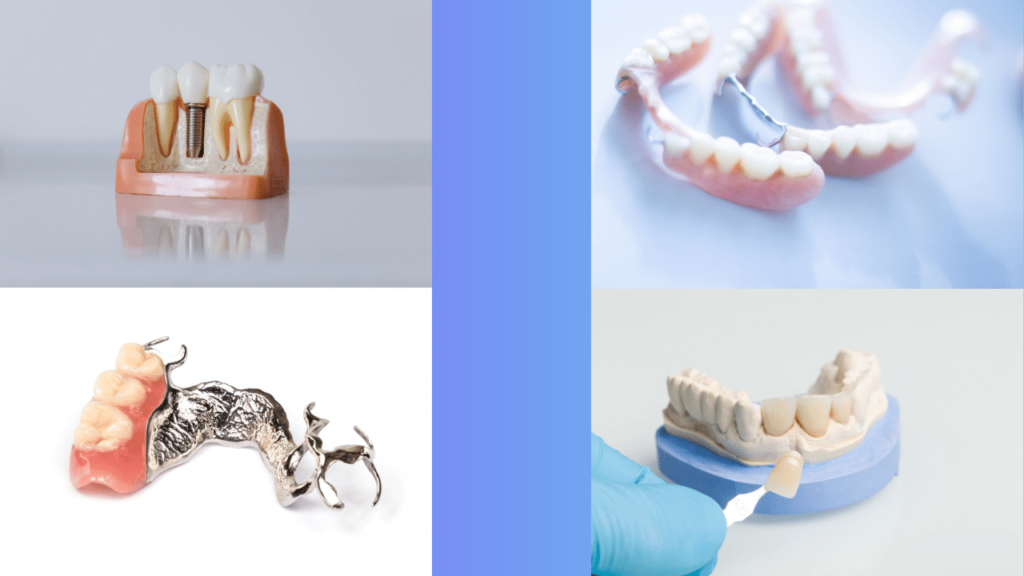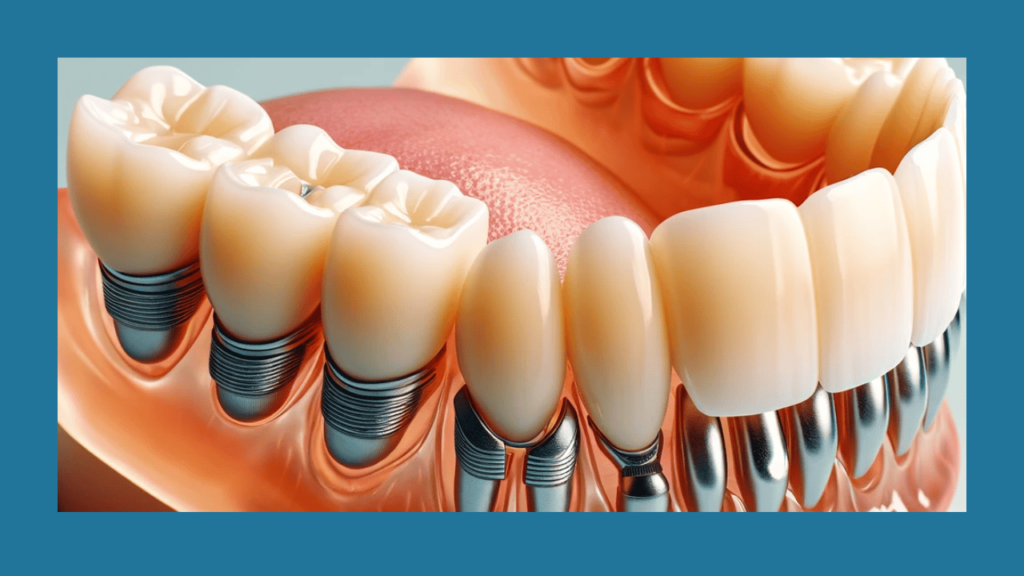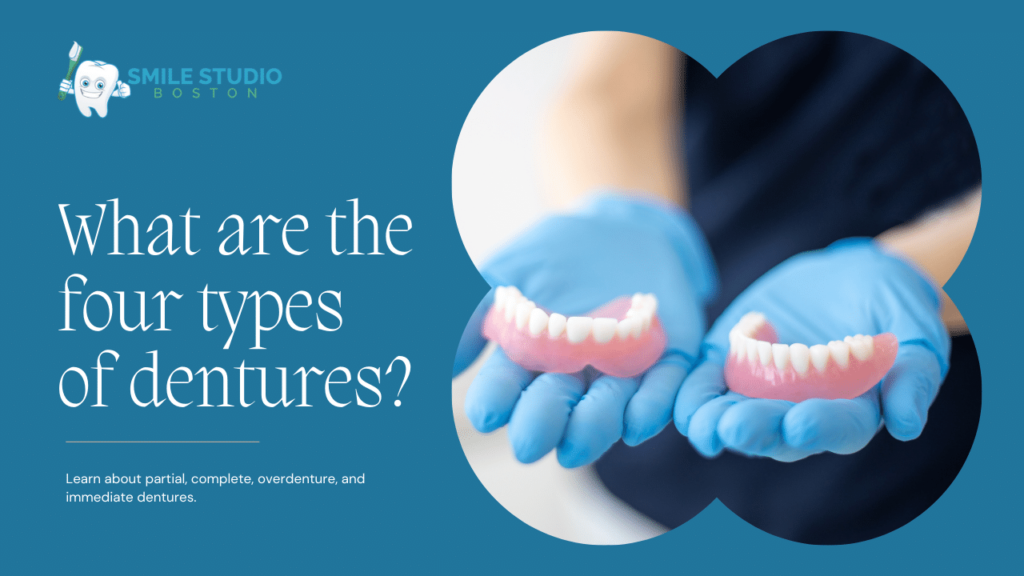Dentures and Their Impact on Dental Health and Aesthetics
Dentures, a significant aspect of modern dental care, are pivotal in enhancing oral health and aesthetics. For those who have lost some or all of their natural teeth, understanding “what are the four types of dentures” is crucial. These dental appliances not only improve the appearance of your smile but are also essential for maintaining good oral health and overall well-being.
Firstly, dentures can dramatically boost your self-esteem. A full, healthy smile plays a vital role in our social lives, impacting the way we interact with others. By filling in the gaps left by missing teeth, dentures can help you feel more confident and comfortable in social settings.
From a health perspective, dentures are essential for keeping your mouth in good shape. They prevent the remaining teeth from shifting, which could otherwise lead to misalignment and more complex dental issues. Dentures also play a crucial role in managing the risks associated with gaps in your teeth, such as the buildup of bacteria, which can lead to tooth decay and gum disease.
The evolution of dentistry has significantly improved dentures’ design and functionality. Modern dentures are more comfortable, aesthetically pleasing, and appear closer to natural teeth. While they might require a period of adjustment, their benefits in terms of oral health and the ability to eat and speak more effectively make them a valuable investment.
Moreover, dentures support the structure of your face. They help maintain the shape of your mouth and cheeks, preventing the sagging and aged appearance that can occur with tooth loss. This aspect is crucial not only for your looks but also for your overall facial health.
In essence, dentures are more than just a cosmetic fix. They are a vital tool in maintaining oral health, enhancing your quality of life, and ensuring that you can smile, talk, and eat with ease. While they might take some getting used to, their benefits are undeniable. Modern advancements have made dentures an accessible and practical solution for those looking to restore their smile and oral health.

What are the four types of dentures:
1. Complete Dentures
Complete dentures represent a vital option for individuals who have experienced total tooth loss in either their upper or lower jaws. These dentures are not just about enhancing one’s smile but are integral to oral functionality and overall facial structure.
Composition and Making of Complete Dentures
- Complete dentures are custom-made using acrylic resin, a material favored for its close resemblance to natural gum tissues and adaptability to the unique structure of an individual’s oral cavity.
- The teeth portion of these dentures is typically created from either acrylic or porcelain. Acrylic is often preferred due to its lighter weight and compatibility with the oral environment.
Custom Fitting for Optimal Comfort
- The creation of complete dentures involves precise measurements of the jaw and gums to ensure a comfortable and accurate fit.
- A series of trial dentures are often made in the initial stages. These trials help in achieving the perfect alignment and appearance, ensuring that the final product is both functional and aesthetically pleasing.
Why Complete Dentures are Essential
- For those who have lost all their teeth, complete dentures are not just a cosmetic fix but a necessity. They play a crucial role in supporting the facial structure, preventing the sagging of muscles, and maintaining a more youthful appearance.
- They are key to restoring the basic oral functions such as chewing and speaking, impacting not just health but also the quality of life.
- Complete dentures also help in maintaining the alignment of any remaining teeth, preventing further oral health issues.
Complete dentures are more than just a dental appliance. They are a comprehensive solution for those who have lost their teeth, offering a blend of functionality, health benefits, and aesthetic value. For those considering dentures, consulting with a dental professional can provide deeper insights into their benefits and the process involved in getting them.
2. Partial Dentures
Partial dentures are used when a person has lost some, but not all, teeth in either the upper or lower jaw. They fill the gaps left by missing teeth and are supported by the remaining natural teeth and gum tissue. These dentures consist of false teeth attached to a gum-colored base, often secured with metal or plastic clasps.
Partial dentures come in different types, including cast metal, flexible, and acrylic (flipper tooth) partial dentures. Cast metal partials are durable and offer high stability, while flexible partials blend well with natural teeth and gums, offering a more aesthetic look. Acrylic partials, or flipper teeth, are a temporary solution and the least expensive type.
These dentures are particularly suitable for individuals who aren’t candidates for implant-supported bridges, either due to health reasons or other considerations. They are removable, allowing for easy cleaning and maintenance, which is essential for oral health. For more details on the types of partial dentures and their suitability, you can refer to NewMouth’s comprehensive guide.
3. Implant-Supported Dentures
Implant-supported dentures represent a modern solution in the realm of dental prosthetics, offering options such as fixed bridges and overdentures. The unique aspect of these dentures is their foundation, which relies on dental implants. These implants are small, sturdy posts made of titanium, surgically embedded into the jawbone. This secure method of anchoring not only ensures a stable fit but also contributes to a natural-looking set of teeth.
The process of obtaining implant-supported dentures is more involved, requiring surgical procedures that are both complex and meticulous. This complexity often results in a higher cost compared to traditional dentures. However, the advantages they bring, including improved aesthetics and a stronger bite, make them a valuable investment for many seeking a long-term solution for tooth replacement. The enhanced stability offered by these dentures is particularly beneficial for those who have experienced jawbone loss, helping to preserve the remaining bone structure. Despite the higher initial costs and surgical requirements, implant-supported dentures are increasingly popular due to their durability, comfort, and close resemblance to natural teeth.
4. Immediate Dentures: A Temporary Solution Post-Extraction
Immediate dentures are a temporary dental solution provided immediately after teeth extraction. They are designed to be used during the healing period, serving as a bridge to permanent dentures.
Benefits of Immediate Dentures
These dentures offer several advantages. Primarily, they ensure that individuals don’t have to endure a toothless period while their gums and jaws recover. They help maintain the integrity of facial structures and assist in adapting to the feel and function of dentures. Additionally, immediate dentures aid in the transition to permanent dentures, allowing for a smoother and more comfortable adjustment period.

Caring for Your Dentures
Maintaining dentures is key to their longevity and your oral health. This includes daily cleaning to remove food particles and plaque, using specialized denture cleaning solutions and a soft-bristled brush. It’s important to handle dentures delicately to avoid any damage.
Regular Dental Visits and Lifespan of Dentures
Scheduling regular dental appointments is crucial for the maintenance of your dentures. These check-ups help ensure that your dentures fit correctly and are in good condition. Dentures typically last about 5 to 7 years, but this varies based on care and usage.
Recognizing the Need for Repair or Replacement
Be aware of signs that your dentures need attention, like discomfort, cracks, or a change in fit. Regular dental visits can help identify when it’s time to repair or replace your dentures, ensuring they remain comfortable and functional.
Quick Recap
In conclusion, various types of dentures are designed to meet different dental needs. From complete dentures for full tooth loss to partial dentures for filling specific gaps and from the stability of implant-supported dentures to the immediate solution of temporary dentures post-extraction, each type offers unique benefits. It’s important for individuals to discuss which type is best suited to their specific needs with their dentist.
Consult SmileStudio
If you’re considering dentures, reaching out to a dental clinic for a professional consultation is a great next step. A dentist can provide personalized advice and information to help you on your journey towards improved dental health and a confident smile. Book your appointment here. Contact us here for more details. Smilestudio.
FAQs
1. What are the newest type of dentures?
The newest advancements in dentures are driven by digital dentistry innovations like 3D printing and Artificial Intelligence, which allow for more precise and efficient production.
2. What are the main types of dentures?
The main types of dentures include complete dentures, fixed partial dentures (implant-supported bridges), removable partial dentures, implant-retained dentures (overdentures), immediate dentures, All-On-4 implant dentures, and economy dentures.
3. What are the 4 types of denture patients?
Information specific to the categorization of ‘4 types of denture patients’ isn’t readily available, but denture types are generally chosen based on individual needs and oral health conditions.
4. What are the best dentures to have?
The best dentures depend on individual needs. Implant-supported dentures like overdentures or All-On-4 are often considered superior for stability and functionality.
5. What is the most common denture?
Complete dentures are often the most common type due to their suitability and cost-effectiveness for those who have lost all their teeth.
6. What are the most natural dentures?
Dentures made from advanced materials like porcelain or produced using digital manufacturing techniques generally offer the most natural appearance.


